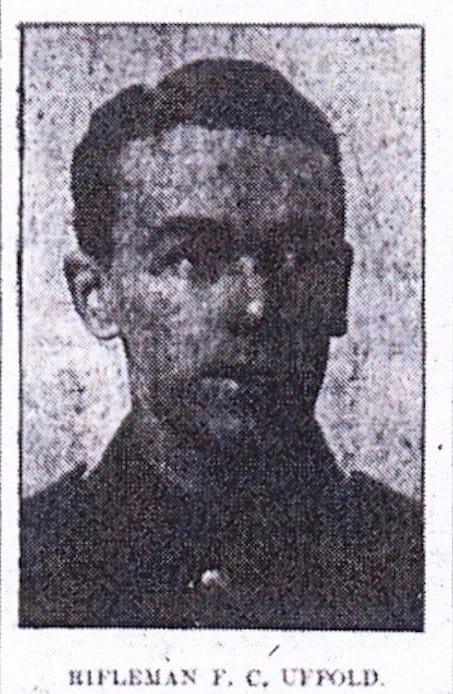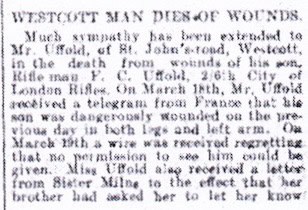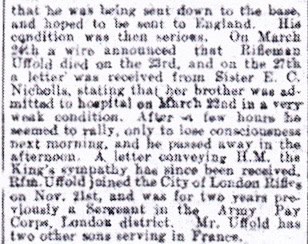
© Dorking Advertiser findmypast.co.uk
Thank you to Westcott Local History Group for allowing Dorking Museum to publish their First World War research.
Frederick Charles Uffold was born in Westcott in 1894 , the son of William Uffold, a blacksmith, and his wife Caroline Uffold who died in 1907. The family lived in St John’s Road, Westcott, but the 1911 census shows that Frederick had moved to lodgings at 241 Lessingham Avenue, Tooting. The census shows he was a student, but also working as a part-time clerk at a printing and publishing firm.
After the outbreak of war Frederick enlisted in London and initially joined the Army Pay Corps. He subsequently transferred to the 2nd/6th (City of London) Battalion, The London Rifle Brigade which had formed in August 1914. The battalion later became part of the 174th Brigade in the 58th (2/1st London) Division which did much of its training in East Anglia before taking over the East Coast defences in Spring 1916. After a short spell on Salisbury Plain the Division left for France and disembarked at Le Havre on 25th January 1917. By 8th February the Division had concentrated at Lucheux, north of Albert and they were very soon in action.
For some months the German High Command had been planning a strategic withdrawal to conserve manpower by withdrawing to a shorter, but very powerful, defensive position which became known as the Hindenburg Line. The construction of this line had been reported by allied airmen in late 1916 and the withdrawal, known as Operation Alberich, began on 9th February 1917. As they withdrew the Germans destroyed villages, roads, bridges and livestock; felled the trees and polluted the wells to deny anything which might be of value to the Allies.
The Allies’ response to the German withdrawal was to advance with caution. Progress was difficult against a stubborn rearguard defence across unfamiliar ground. The winter conditions were severe and resistance increased as the allied forces advanced through successive enemy trench systems nearer the Hindenburg Line. Frederick Uffold was hit and taken to one of the base hospitals at Etaples, near Boulogne, where he died of wounds on 23rd March 1917.

WESTCOTT MAN DIES OF WOUNDS
Much sympathy has been extended to Mr. Clifford, of St. John’s Road Westcott, in the death from wounds of his son, Rifleman F. C. Uffold 2/6th City of London Rifles. On March 18th, Mr. Uffold received a telegram from France that his son was dangerously wounded on the previous day in both legs and left arm. On March 19th a wire was received regretting that no permission to see him could be given. Miss Uffold also received a letter from Sister Milne to the effect that her brother had asked her to let her know

that he was being sent down to the base and hoped to be sent to England. His condition was then serious. On March 24th a wire announced that Rifleman Uffold died on the 23rd, and on the 27th a letter was received from Sister E. C. Nicholls, stating that her brother was admitted to hospital on March 22nd in a very weak condition. After a few hours he seemed to rally, only to lose consciousness next morning, and he passed away in the afternoon. A letter conveying H. M. the King’s sympathy has since been received. Rfm. Uffold joined the City of London Rifles on Nov 21st, and was for two years previously a Sergeant in the Army Pay Corps. London district. Mr. Uffold has two other sons serving in France.
Frederick Uffold Death Notice © Dorking Advertiser findmypast.co.uk
The allied pursuit halted before the Hindenburg Line on 9th April 1917. The pursuit had marked a break-out from the stalemate of trench warfare and the allied commanders were hopeful this would continue, but this was not to be. The Hindenburg Line proved to be almost impregnable and was not finally breached until August 1918 when the end of the war was in sight.
Frederick Uffold was buried in Etaples Military Cemetery. The area around Etaples was the scene of immense concentrations of Commonwealth reinforcement camps and hospitals. By 1917 100,000 troops were camped among the sand dunes. The hospitals, which included eleven general, one stationary, four Red Cross hospitals and a convalescent depot, could deal with 22,000 wounded or sick personnel. The cemetery there contains 10,771 Commonwealth graves and is the largest War Graves Commission cemetery in France.
Frederick’s brother oldest brother, Alfred, died of wounds just over a year later and is also commemorated on our memorial. William Uffold, their widowed father, lost these two sons and a third son, Edward, was gassed; fortunately he survived. The Uffold family paid a particularly heavy price as a result of the First World War.
| Born | Westcott, Surrey | |
| Lived | Tooting, London | |
| Son of | William and Caroline Uffold of St. John’s Road, Westcott | |
| Brother of | Alfred James Uffold | |
| Regiment | 2nd/6th Battalion. London Regiment (City of London Rifles) | |
| Number | 323672 | |
| Date of Death | 23rd March 1917 | |
| Place of Death | Etaples, France | |
| Cause of Death | Died of wounds | |
| Age | 33 | |
| Memorial | Etaples Military Cemetery, France. |

